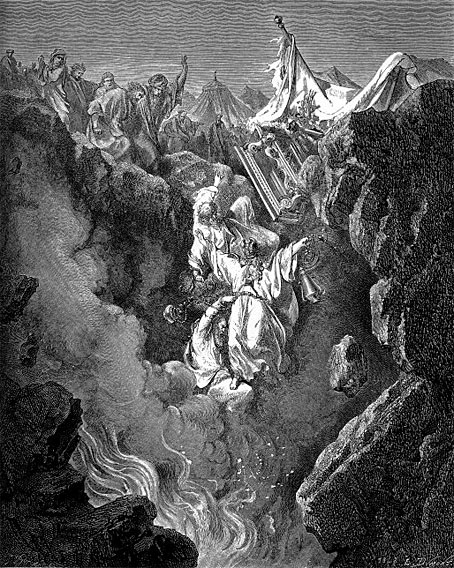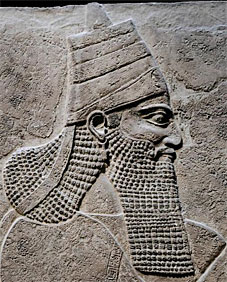Jul
1
2009
“Because of 18th century rationalism in our culture, we are the heirs of a tradition of thinking that downplays symbolism in communication. The assumption is that all truth comes in the categories of philosophical statements. We are very much at home reading St Paul because he uses abstract language: justification; sanctification; glorification; propitiation… We think that this is the best way to communicate and nail things down.
But this is not the way God communicates. God communicates in parables as well as abstract ideas. God communicates in architectural forms, in proverbs, in songs. God’s way of educating young people is the Proverbs. Our way is to make them memorise a list of abstract nouns. That’s what the Shorter Catechism is. The Proverbs have a different way of communicating, a way that is much more holistic. It strikes the human personality at a deeper level.”
–James B. Jordan, The Bible as Picture, Basilean Lectures 1990.
Comments Off | tags: James Jordan, Paul, Proverbs, Rationalism | posted in Biblical Theology, Quotes
Jul
1
2009
“Nothing is plainer than that Paul sets his gospel over against all the doings of the carnal man, and not against the expectant but faithful Jew.”
Excerpt from Called To Be An Apostle
Sermon by Doug Wilson, Nov 25, 2008.
 “In our overview of the entire book of Romans, we noted that chapter one showed the Gentiles were under sin, chapter two showed the Jews under sin, and chapter three showed them both up to their necks in the same kind of sin. This is important for us to note at the beginning of this book because the gospel set forth here is a gospel that liberates the nations from wickness, evil, sin, mortality, and so forth. This will be important for us to understand when we get to chapter seven, and Paul’s description of himself there as a representative Jew, but it is also important for us to see the nature of Saul’s conversion to Christ rightly. Otherwise, we will get everything confused. For now, we need to see that the gospel directly addresses what preachers in another era used to call sin.
“In our overview of the entire book of Romans, we noted that chapter one showed the Gentiles were under sin, chapter two showed the Jews under sin, and chapter three showed them both up to their necks in the same kind of sin. This is important for us to note at the beginning of this book because the gospel set forth here is a gospel that liberates the nations from wickness, evil, sin, mortality, and so forth. This will be important for us to understand when we get to chapter seven, and Paul’s description of himself there as a representative Jew, but it is also important for us to see the nature of Saul’s conversion to Christ rightly. Otherwise, we will get everything confused. For now, we need to see that the gospel directly addresses what preachers in another era used to call sin.
Continue reading
Comments Off | tags: Circumcision, Doug Wilson, New Perspective on Paul, Paul | posted in Biblical Theology, Quotes
Jun
29
2009
James Jordan’s work on the Jew-Gentile oikoumene set up in Daniel has far reaching implications.1 Peter Leithart writes:
“Yoder argues that from the time of the Babylonian captivity, the Jews developed a proto-”free church” model of community life. True in some respects. Jews didn’t have their own polity. But I’ve got doubts if that’s a fair characterization of Jews in and after the exile.
Continue reading
Comments Off | tags: AD70, Archaeology, Daniel, Esther, Exile, Hellenism, Mordecai, Nehemiah, oikoumene, Peter Leithart, Tertullian, Yoder | posted in Biblical Theology, Quotes, The Last Days, The Restoration Era
Jun
29
2009
“If you’re a pastor and you want your people to hear the hard things you have to say, you’ve got to give them your flesh and your blood. Jesus gave His to earn the right to a hearing. People will hear what you have to say when they see that you bleed for them and that you give them yourself.”
–James B. Jordan, The Bible as Literature, Basilean Lectures 1990.
Comments Off | tags: James Jordan, Preaching | posted in Christian Life, Quotes
Jun
27
2009
or Silencing the Higher Critics

Yet more on literary analysis of the Bible as a ‘terrible marvel‘; a review of two books. As Warren Gage has commented, we are on the verge of a tremendously creative time in Biblical theology. But this to me seems also to be an element of scholarship returning home, older and wiser, from a wilderness of unbelief.
Genesis: The Story We Haven’t Heard
by Paul Borgman. Downers Grove, IL: Intervarsity Press, 2001. 252 pages.
The Literary Structure of the Old Testament: A Commentary on Genesis-Malachi
by David A. Dorsey. Grand Rapids, MI: Baker Books, 1999. 330 pages.
Reviewed by Timothy Paul Erdel, Ph.D., Archivist and Assistant Professor of Religion and Philosophy, Bethel College, Mishawaka, IN.
“I have been fascinated by the primal power of Old Testament stories for as long as I can remember. From my perspective, there is no clearer window on human character, no greater storehouse of hard and holy truths. Yet some tales are deeply disturbing. Phyllis Trible calls them ‘texts of terror.’ Even the most familiar passages may seem strangely distant. So I relish each time a preacher or teacher sheds new light on these ancient Hebrew narratives.
Continue reading
Comments Off | tags: Abraham, Babel, C. S. Lewis, Chiasm, Compromise, David A. Dorsey, Higher Criticism, Isaiah, Jeremiah, Literary Structure, Warren Gage | posted in Biblical Theology, Quotes
Jun
25
2009
 “Let no one deceive you by any means; for that Day will not come unless the falling away comes first, and the man of sin is revealed, the son of perdition.” (2 Thessalonians 2:3)
“Let no one deceive you by any means; for that Day will not come unless the falling away comes first, and the man of sin is revealed, the son of perdition.” (2 Thessalonians 2:3)
Non-dispensationalists are often accused of “Replacement Theology,” that is, the church replaced Israel. But we find in the Old Testament many examples of the same process prefiguring what the people of God went through in the first century. It is not replacement, but transformation.
Continue reading
Comments Off | tags: Aaron, AD70, Caleb, Ezra, James Jordan, Judaisers, Korah, Moses | posted in Biblical Theology, Quotes, The Last Days
Jun
25
2009

John Piper explains why he invited Doug Wilson to speak at DG’s Fall conference, here.
Comments Off | tags: Doug Wilson, John Piper | posted in Quotes
Jun
22
2009
 “…the crisis of fatherhood, in its many forms, is at the root of most disorders in this late stage of Western civilization. And the root is intimately connected to the loss of our consciousness of the hierarchical nature of the created order. Large numbers of people not only seem unable to believe in God, but also cannot conceptualize Him in their thoughts and their hearts. The icon in the heart—the icon of fatherhood—is either damaged or absent entirely. Continue reading
“…the crisis of fatherhood, in its many forms, is at the root of most disorders in this late stage of Western civilization. And the root is intimately connected to the loss of our consciousness of the hierarchical nature of the created order. Large numbers of people not only seem unable to believe in God, but also cannot conceptualize Him in their thoughts and their hearts. The icon in the heart—the icon of fatherhood—is either damaged or absent entirely. Continue reading
Comments Off | tags: Culture, Fatherhood, Michael O'Brien | posted in Biblical Theology, Christian Life, Quotes
Jun
20
2009
 or Systematic and Biblical Theologies
or Systematic and Biblical Theologies
More on typology. A helpful picture.
Tim Challies summarises Gage and Barber’s approach in their study guide on Genesis 37-50:
“I have learned to expect to be underwhelmed with study guides. Sadly, it was with this expectation that I began to read The Story of Joseph and Judah, a guide written by Warren Gage, Associate Professor of Old Testament at Knox Theological Seminary and Christopher Barber, a lawyer who is also a graduate of Knox Theological Seminary. I am glad to say that this guide, which promises to provide a ‘fresh look at Genesis 37-50,’ does just that and does it very well.
Continue reading
Comments Off | tags: Joseph, Judah, Tim Challies, Typology, Warren Gage | posted in Biblical Theology, Quotes
Jun
19
2009
 “Assyria dominated the ancient world in the centuries before the exile of Judah. Sometime during the reign of Jeroboam II of Israel (832–792 bc), and probably toward the latter part of that reign, the Israelite prophet Jonah had been used by God to convert the city Nineveh and all its citizens to the worship of the true God. Jonah 3:5 and 4:11 indicate that God showed His mercy to the children of the city, so that we are entitled to assume that there were God-fearing people alive for the next seventy or so years in Assyria…
“Assyria dominated the ancient world in the centuries before the exile of Judah. Sometime during the reign of Jeroboam II of Israel (832–792 bc), and probably toward the latter part of that reign, the Israelite prophet Jonah had been used by God to convert the city Nineveh and all its citizens to the worship of the true God. Jonah 3:5 and 4:11 indicate that God showed His mercy to the children of the city, so that we are entitled to assume that there were God-fearing people alive for the next seventy or so years in Assyria…
Continue reading
Comments Off | tags: Assyria, Bible history, James Jordan, Jeremiah, Nineveh, Remnant | posted in Quotes
































